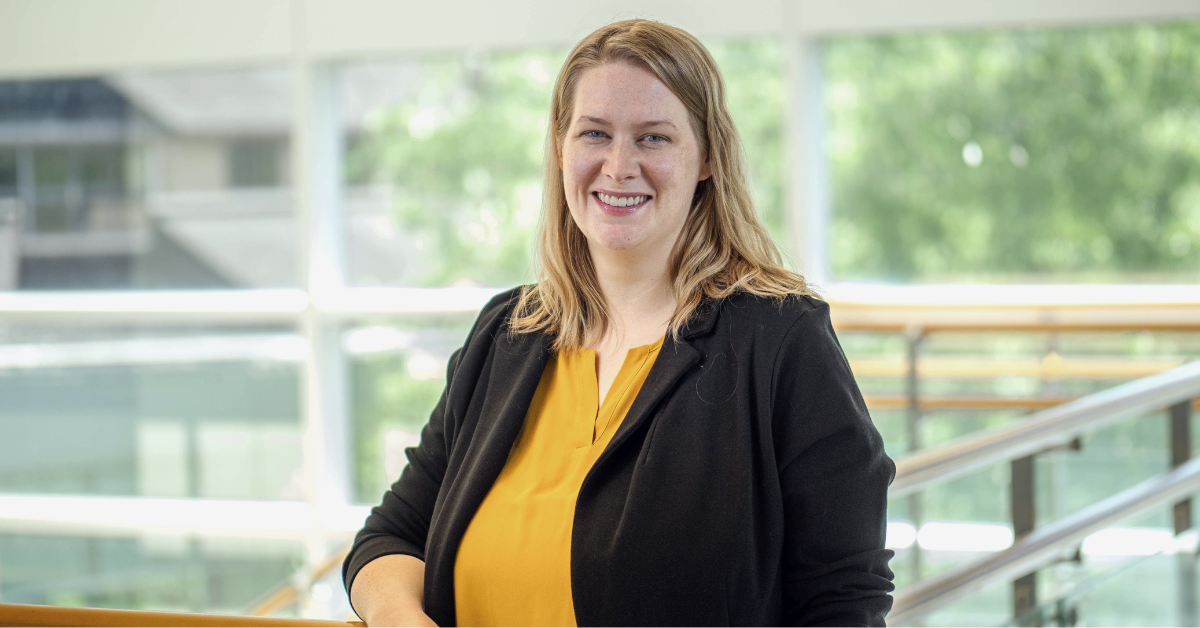New Inpatient Visitor Check-In Process Effective March 10. Learn more here.
Breadcrumb
- Home
- Fox Chase Cancer Center News
- Fox Chase Cancer Center’s Erin K. Tagai Receives Prevent Cancer Foundation Grant to Develop Tool to Assist Patients Awaiting Genetic Testing Results
Fox Chase Cancer Center’s Erin K. Tagai Receives Prevent Cancer Foundation Grant to Develop Tool to Assist Patients Awaiting Genetic Testing Results

PHILADELPHIA (February 25, 2025) — Erin K. Tagai, PhD, MPH, an Assistant Professor in the Cancer Prevention and Control Research Program at Fox Chase Cancer Center, has received a grant from the Prevent Cancer Foundation to fund development of a ChatBot for patients receiving genetic testing results.
“Every year, tens of thousands of people in the United States are diagnosed with preventable cancer due to an unknown hereditary risk of cancer due to genetics. I’m very grateful for this generous grant because it will allow us to develop a tool that will fill a key gap for patients receiving genetic counseling,” Tagai said.
“While the public has a favorable view on genetics in medicine, the lack of awareness about genetic testing means some people with an increased cancer risk are missing out on opportunities to prevent cancer or detect it early by making informed, personalized care decisions based on genetic testing.”
To increase patient knowledge, reduce distress, and improve patient-provider communication, Tagai is collaborating with Michael J. Hall, MD, MS, FASCO, Chair and Professor in the Department of Clinical Genetics at Fox Chase, and Slobodan Vucetic, PhD, Director of the Temple University Center for Hybrid Intelligence, to develop a large language model-based ChatBot called “GenChat.” It will be designed to deliver genetic testing results, provide medically accurate and lay friendly information, and encourage patients to follow up with their genetic counselor for more information and support.
“Many individuals are understandably worried when they receive their genetic test results, which can often be confusing, and are left to wonder what the results mean for themselves and their families,” Tagai added. “Our goal is to help people better understand their results and improve their communication with genetic counselors during appointments.”
In addition to Tagai, the Prevent Cancer Foundation is funding nine other scientists who are exploring innovative approaches in artificial intelligence tools, developing new imaging platforms, addressing health disparities, and more. Each scientist has been awarded $100,000 for a two-year period. Areas of focus include brain, breast, cervical, head and neck, kidney, lung, prostate, skin (including melanoma), uterine, and ovarian cancers. These research projects have been funded thanks to the generosity of donors.
The Prevent Cancer Foundation is the only U.S.-based nonprofit organization solely dedicated to cancer prevention and early detection. Through research, education, outreach, and advocacy, it has helped countless people avoid a cancer diagnosis or detect their cancer early enough to be successfully treated. The foundation is driven by a vision of a world where cancer is preventable, detectable, and beatable for all.
The foundation is rising to meet the challenge of reducing cancer deaths by 40% by 2035. To achieve this, it is committed to investing $20 million for innovative technologies to detect cancer early and advance multi-cancer screening, $10 million to expand cancer screening and vaccination access to medically underserved communities, and $10 million to educate the public about screening and vaccination options.
Fox Chase Cancer Center (Fox Chase), which includes the Institute for Cancer Research and the American Oncologic Hospital and is a part of Temple Health, is one of the leading comprehensive cancer centers in the United States. Founded in 1904 in Philadelphia as one of the nation’s first cancer hospitals, Fox Chase was also among the first institutions to be designated a National Cancer Institute Comprehensive Cancer Center in 1974. Fox Chase is also one of just 10 members of the Alliance of Dedicated Cancer Centers. Fox Chase researchers have won the highest awards in their fields, including two Nobel Prizes. Fox Chase physicians are also routinely recognized in national rankings, and the Center’s nursing program has received the Magnet recognition for excellence six consecutive times. Today, Fox Chase conducts a broad array of nationally competitive basic, translational, and clinical research, with special programs in cancer prevention, detection, survivorship, and community outreach. It is the policy of Fox Chase Cancer Center that there shall be no exclusion from, or participation in, and no one denied the benefits of, the delivery of quality medical care on the basis of race, ethnicity, religion, sexual orientation, gender, gender identity/expression, disability, age, ancestry, color, national origin, physical ability, level of education, or source of payment.
For more information, call 888-369-2427
Share
-
Share with Facebook
-
Share with twitter
-
Share with email
-
Print this